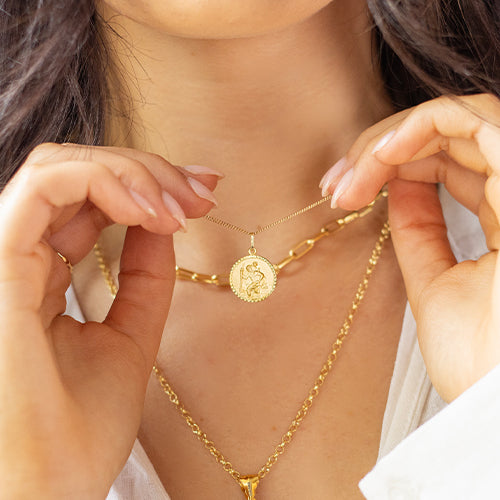
How Does Jewellery Impact Your Confidence and Self-Esteem: Unveiling the Psychological Effects
Jewellery has long been associated with more than just aesthetics; it plays a significant role in the wearer's perception of self and can markedly influence levels of confidence and self-esteem. From sparkling gemstones to understated gold bands, the pieces chosen are often an external display of your personality, accomplishments, and even aspirations. The psychological impact of these adornments is substantial, capable of transforming not only the way a person is perceived by others but also how they view themselves.
We all want to feel good about ourselves and how we look and the confidence we project can be boosted by our choice of clothing and accessories, especially jewellery. With mindfulness and good mental health a top priority for 2024, the Lily Blanche team has been researching the effects that great jewellery can have on our self-esteem and confidence.
Different settings see jewellery taking on different roles—what serves to embolden in a social scenario might also be a source of professional empowerment. Age and gender further complicate the relationship between jewellery and self-worth, as cultural narratives and personal experiences dictate the significance placed on these precious items. As individuals navigate through diverse life stages, the choice of jewellery often reflects their evolving identity and self-regard.
Key Takeaways
- Jewellery can significantly influence an individual's self-perception and confidence levels.
- The role of jewellery in enhancing self-esteem is complex and varies with different social and professional contexts.
- Individual experiences with jewellery are shaped by a variety of factors, including age and gender.

Psychological Significance of Jewellery
Jewellery serves not just as decoration but also notably influences the psychology of the wearer. It reinforces your self-perception and can have an affirming effect on confidence and self-esteem.
Symbolism and Personal Identity
Jewellery is often a form of self-expression, reflecting your identity and personal values. A piece of jewellery may symbolise significant life milestones, such as a graduation ring or a wedding band, anchoring your sense of self and personal history. These items can serve as a tangible connection to cherished memories or loved ones, enhancing your emotional well-being and sense of self-worth.
- Examples:
- A locket containing family photographs can evoke a sentiment of belonging and love.
- Achievement-related jewellery, like a career milestone ring or necklace, can boost confidence in your professional abilities.
Cultural and Social Influences
The role that jewellery plays in social and cultural contexts can greatly impact your self-esteem and confidence. In many societies, jewellery is a marker of status, wealth, and social affiliation which, in turn, can influence an individual’s standing within a social group.
- Norms vary widely:
- In some cultures, elaborate jewellery signifies high status, while in others, minimalist pieces are the norm for the affluent.
- Certain communities use jewellery to signify rites of passage, thereby reflecting a person's transition and growth within the society.
Jewellery's impact on your confidence and self-esteem is multifaceted, encompassing personal symbolism and broader cultural significance.
Impact on Self-Esteem

Jewellery can significantly influence your self-esteem by enhancing their self-perception and societal status.
Perceived Attractiveness
Jewellery often amplifies your perceived attractiveness, contributing to a positive self-image. A well-chosen piece can accentuate personal features, complement attire, and express individual style. This aesthetic enhancement is closely tied to an increase in self-confidence, as you tend to feel more appealing and assured in your appearance when you believe you look good.
Wealth and Prestige Association
Jewellery is also associated with wealth and prestige. The ownership of valuable pieces can lead to a heightened sense of status and success, impacting self-esteem. In particular:
- Ownership: Possessing jewellery, especially pieces that are costly or from well-known brands, can symbolise financial success and social standing.
- Perception: Others may perceive individuals adorned with fine jewellery as more successful, which can in turn boost the wearer's self-perception and confidence.
Confidence Building Through Accessories

Accessorising can significantly enhance you self-confidence by reflecting personal style and offering a sense of control over your appearance.
Choice and Control
You often feel a boost in self-esteem when you have agency in your choices, including the selection of jewellery. The act of choosing accessories that align with your personal taste can instil a sense of control and self-expression. For example, you may opt for a statement necklace to convey creativity, or a sleek watch to suggest professionalism.
- Key Aspects of Choice and Control:
- Personal Style: Tailoring accessory choices to your own taste.
- Decision-Making: The power to choose what to wear and when.
- Variety: A broad selection of options enables more precise self-expression.
Empowerment Through Adornment

Jewellery can also empower you by serving as a symbol of certain achievements or milestones. A graduation ring, for instance, might be a tangible reminder of your academic accomplishments, thereby boosting self-esteem. Moreover, culturally significant pieces, such as a claddagh ring or family heirloom, can reinforce self-identity and pride.
- Examples of Empowerment:
- Achievement Symbols: Rings or pendants that signify personal success.
- Cultural Significance: Items that represent heritage or tradition.
- Professional Identity: Accessories reflecting your career or professional aspirations.
Adorning yourself with jewellery is more than mere decoration; it is a potent means of self-empowerment and confidence enhancement.
Jewellery in Professional Settings
In professional environments, jewellery can serve as subtle indicators of your status and attention to detail. It often aligns with the norms expected in a workplace and can enhance perceptions of authority and competence.
Workplace Jewellery Norms
Workplace jewellery norms can widely vary depending on the industry and company culture. However, several common themes often apply:
- Conservatism: In many business environments, especially in fields such as law, finance, and corporate services, conservative jewellery that complements professional attire is encouraged. Pieces might include simple earrings, watches, and rings.
- Cultural Sensitivity: You should always consider cultural norms and differences when selecting jewellery for work. Some organisations embrace cultural expressions, while others expect a more uniform appearance.
The use of jewellery should not distract from the professional setting but should rather highlight your polished presence.
Authority and Competence Symbols
Jewellery can symbolise authority and competence through its design and portrayal:
- Quality over Quantity: A preference for high-quality, well-crafted pieces signifies a commitment to excellence and a detail-oriented personality. For instance, you might wear a single, distinguished watch or a tasteful brooch to convey sophistication.
- Role-Signifying Pieces: Certain jewellery items, such as cufflinks or tie clips for men, and brooches or scarf rings for women, might be associated with senior positions and can thus signal authority within a professional hierarchy.
When selected thoughtfully, jewellery used in a professional setting can underscore your credibility and contribute positively to their self-assurance and the esteem in which they are held by colleagues.
Age and Gender Perspectives on Jewellery
The impact of jewellery on confidence and self-esteem can be significantly influenced by both age and gender expectations within society.
Gender Roles and Jewellery
Historically, jewellery has been a marker of gender roles, with specific designs and materials often targeting either male or female consumers. Women have traditionally been associated with delicate, ornate pieces, utilising gems like diamonds and sapphires, while men's jewellery has typically been more robust, featuring metals like titanium and leather. These gendered preferences reflect societal expectations and can affect the wearer's perception in both personal and professional settings.
Age-Related Jewellery Trends
As individuals age, their tastes in jewellery often evolve. Young adults may prefer trendy, fashion-forward pieces that signify their youthful spirit, often using affordable materials like acrylic or stainless steel. In contrast, mature adults may choose more classic, timeless pieces, a testament to their life's achievements and status. This shift not only indicates changing aesthetics but also represents different stages of life and the associated confidence that each stage confers.
The power of gemstones to alter mood

Gemstones have long been associated with various emotional and psychological benefits. They are often thought to carry intrinsic energies that can influence an individual's mood. While scientific evidence is yet to conclusively prove these effects, many wearers report noticeable shifts in their emotional well-being when donning specific stones.
- Amethyst, for example, is believed to promote calmness and clarity. Its soothing purple hue is said to reduce stress and anxiety, potentially aiding in the regulation of mood swings.
- Rose Quartz is often associated with love and harmony. Its gentle pink essence might enhance feelings of self-love and emotional healing.
- Citrine, with its bright, sunny appearance, is thought to be energising, fostering a sense of optimism and positivity.
You might choose jewellery featuring these gemstones not just for their aesthetic appeal but for the perceived emotional support they offer. Although such effects are subjective and vary between individuals, the psychological impact of wearing gemstones is an area of interest for many.
|
Gemstone |
Mood Association |
Common Belief |
|
Amethyst |
Calmness, Clarity |
May alleviate stress and anxiety |
|
Rose Quartz |
Love, Harmony |
Could promote emotional healing |
|
Citrine |
Optimism, Positivity |
Believed to boost energy levels |
In selecting gemstone jewellery, it may be helpful to consider the colours and purported properties attributed to each stone. Whether the impact is psychological, due to a belief in the stone's power, or simply a response to their beauty, gemstone jewellery holds a special place in the context of confidence and self-esteem.
Frequently Asked Questions
Jewellery has a notable influence on personal confidence and self-esteem. This section addresses common enquiries regarding its impact.
In what ways can jewellery enhance a person's confidence?
Jewellery acts as an extension of one’s personal style. By selecting pieces that complement their appearance and convey their sense of fashion, individuals often report feeling more self-assured and poised.
What can we deduce about an individual from their choice of jewellery?
Your choice of jewellery can indicate personal tastes, cultural backgrounds, and even social status. Choices in jewellery can be a form of non-verbal communication that offers insights into a person's personality and values.
How do people perceive others based on the type of jewellery they wear?
The type of jewellery you wear can shape others' perceptions. Designer and bespoke pieces might be associated with affluence and a refined taste, while unique or eclectic choices might suggest creativity and individuality.
What role does jewellery play in expressing identity and boosting self-perception?
Jewellery can be integral to how you express your identity. Be it through cultural symbols, personal motifs, or the sheer aesthetic of different metals and gems, jewellery can reinforce your self-image and boost self-perception by reflecting personal narratives.
Can the act of wearing jewellery influence one's emotional state?
Wearing jewellery can positively affect your emotional state. We often attach sentimental value to pieces which in turn can serve as a source of comfort or a reminder of happy memories, thereby uplifting our mood.
What is the psychological impact of integrating jewellery into daily fashion and style?
Regularly integrating jewellery into your style routine can lead to an increased sense of identity and continuity. It can foster a sense of preparedness for social interaction and contribute to establishing a consistent personal brand, which is psychologically reassuring.
ends

